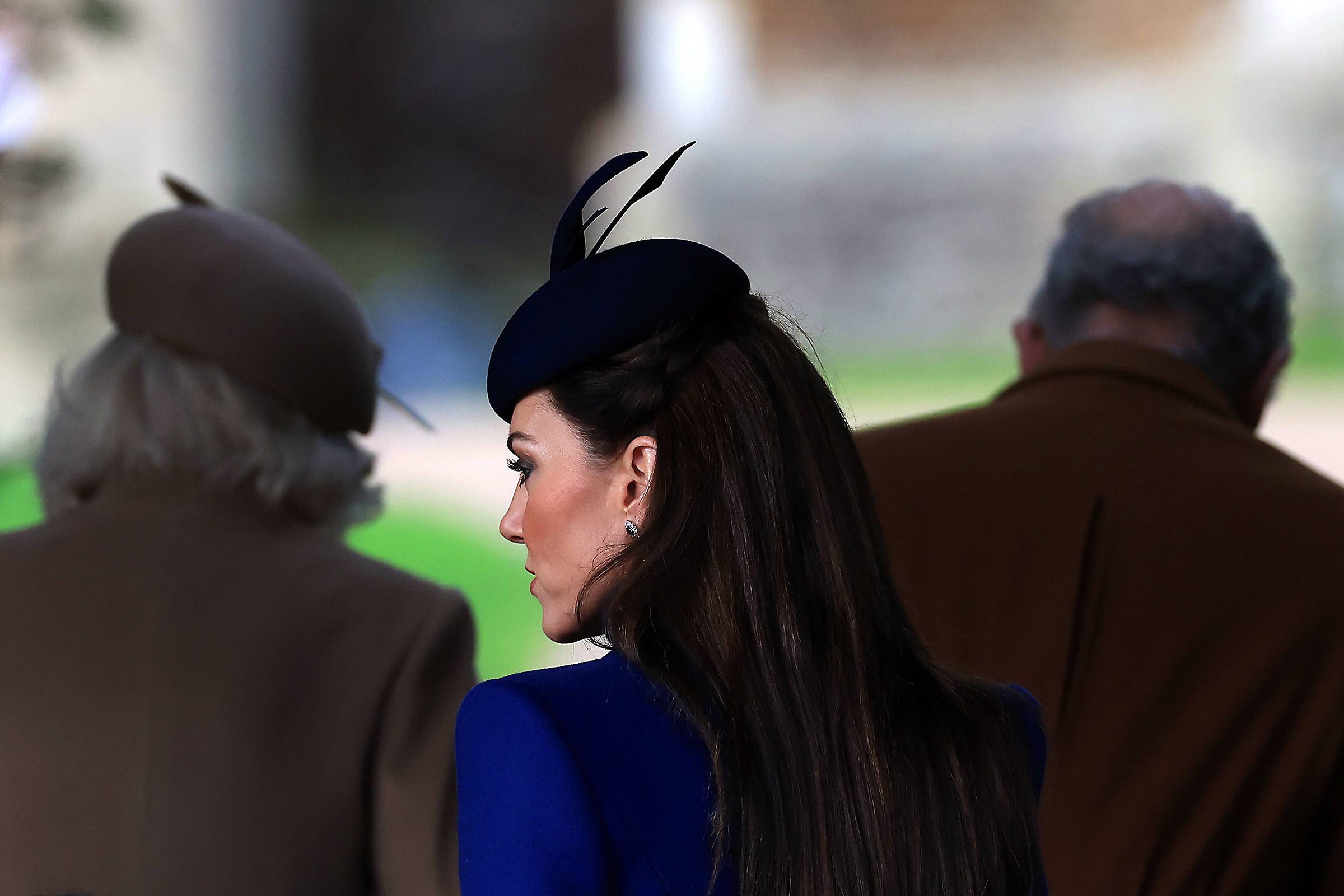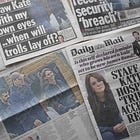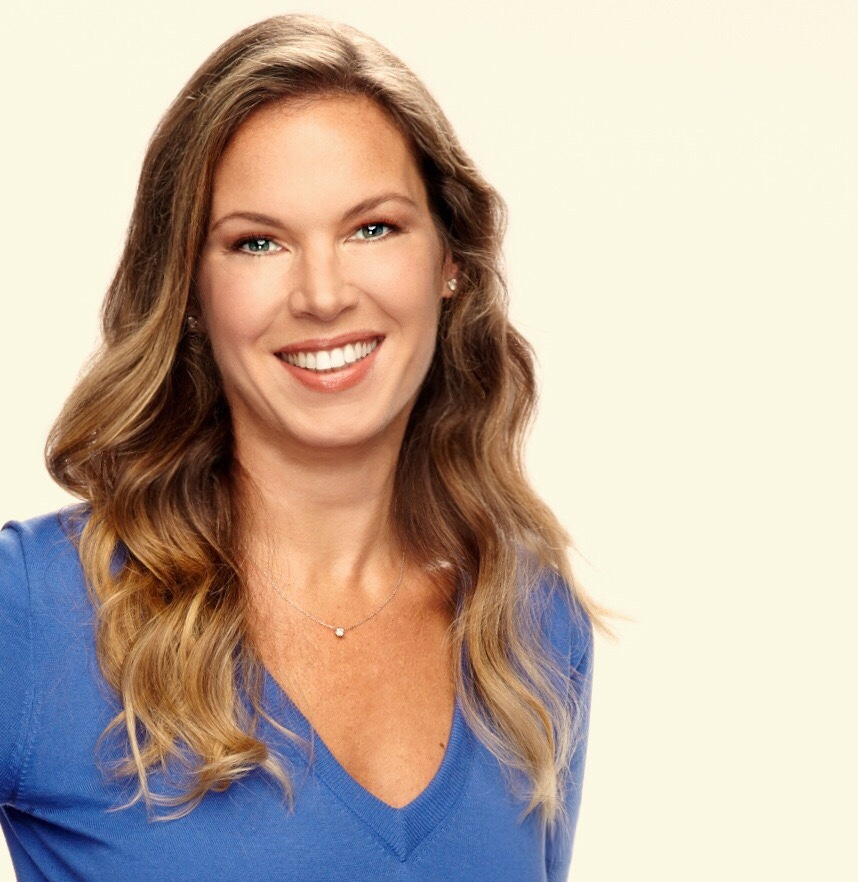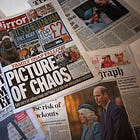Kate Coyne on How the Royal Family Made a Bad Situation Worse
‘It would be difficult to fathom a more baffling misfire of what should be basic human responses.’
Hello! I am back in your inboxes with the second of two guest essays reflecting on the royal news of late. Eager for more informed takes, I asked two journalists — one from the UK, another from the US — to offer their thoughts on the events and discourse surrounding Catherine, the Princess of Wales.
ICYMI: Vicky Smith on How the Media Coverage of Catherine Spiraled out of the Palace’s Control
Below you will find a piece from Kate Coyne, the former editorial director of People magazine. I have admired Kate’s work for years, including her many celebrated cover stories; now I regularly slide into her DMs to discuss the Windsors. Her interest in the family runs deep, predating her time studying at Oxford University. While at People, she oversaw the magazine’s special issue on Prince William and Kate Middleton’s wedding.
Kate’s essay looks at the American enthusiasm around, and expectations of, the royal family, as well as how the US response is informed by a uniquely tell-it-all culture. She also questions the Firm’s “half-truths and subterfuge” and wonders why William wasn’t on the bench with Catherine.
Thank you for your support of So Many Thoughts, which makes it possible for me to do this work and pay contributing writers! If you haven’t already, please consider upgrading for $5 / month.
Kate Coyne on How the Royal Family Made a Bad Situation Worse
Kate Coyne served as the editorial director of People magazine, where she oversaw the magazine’s special issue devoted to the royal wedding of Prince William and Catherine Middleton. Prior to that, she was the Entertainment Editor of Good Housekeeping and a reporter for The New York Post. Having lived in England for four years, she remains perhaps excessively devoted to royal-watching.
By Kate Coyne
The thing about a monarchy, from the perspective of those of us here in the United States who avidly follow the not-always-merry lives of Windsors, Waleses, Sussexes et al, is that it is fundamentally unnatural. We do not have kings and queens, and despite the “American royalty” label that has been attached to everyone from the Kennedys to Beyoncé and Jay-Z, we still largely pride ourselves on not worshiping people simply because they were born to a certain bloodline (just ask any celebrity who has been derisively dismissed as a “nepo baby” over the past year).
Yet watching the drama that has engulfed the royal family over the past two months — from Catherine’s’s sudden abdominal surgery to her total disappearance from the public eye, the ensuing spiral of conspiracy theories and the Photoshopped fuel that Kensington Palace added to the fire — has meant arriving at an entirely new understanding of just how unnatural, and dysfunctional, the British monarchy has become. From a journalistic standpoint, it would be hard to envision a worse string of unforced errors from the public relations machine at Kensington Palace. From an emotional standpoint, it would be difficult to fathom a more baffling misfire of what should be basic human responses.
There is no question that the Princess of Wales is, of course, entitled to keep her medical information private. But nature abhors a vacuum. In the face of no information coming from the prince, the palace, or the usual unnamed sources, content creators stepped in to fill that vacuum.
“While Americans might not invest their tax dollars into the British monarchy, in many ways we outpace our British brethren in terms of the attention and fascination we heap upon this family.”
In the United States especially, TikTok, Instagram and Facebook were awash with theories explaining Kate’s absence ranging from the silly (She cut bangs and is waiting for them to grow out!) to the sordid (There’s another woman involved and here are twenty different biographies about her!). Of course, while Americans might not invest their tax dollars into the British monarchy, in many ways we outpace our British brethren in terms of the attention and fascination we heap upon this family. The result is a presumed sort of access, a false familiarity whereby we feel as if we know these people and are owed some measure of their humanity. We supported William and Harry through the loss of their beloved mother, cheered them on through their courtships, set our alarms for their weddings, made our peace with Camilla (somewhat) and continue to mourn the now-fractured bond between the brothers.
In exchange, we think we ought to know how they’re coping with each new milestone in their lives. Harry, ironically the one who vociferously proclaims his hatred of the press, has obliged the most — with a memoir, a reality docu-series, and a wife who uniquely understands the dance between public and private in the way only a famous actress can. But William, more and more, appears to be cut from much the same cloth as his father, who always looks on the verge of throwing a tantrum when placed in the public eye for too long. Then again, much of how the working royal family conducts themselves can seem to defy normal behavior.

It was unnatural not to offer any explanation for why a surgery was somehow both “planned” and yet conflicted with prior engagements. It seemed unnatural for a surgery to require a nearly two-week hospital stay, far lengthier than most standard procedures (organ transplant patients are often released more quickly). It was unnatural for William to be seen arriving at the hospital only once during Kate’s entire stay, particularly as Camilla walked in the front door to visit the also-ailing King Charles III daily. It was unnatural for William to make public appearances solo, shake hands, smile for the cameras, and barely utter a word about Kate’s recovery. And it was something beyond unnatural — it was, frankly, unbelievable — to attempt to reassure the public about Kate’s well-being with a horribly botched photograph of her and the kids.
As the old political adage goes, it’s not the crime, it’s the cover-up. Keeping Kate’s diagnosis under wraps was one thing. The half-truths and subterfuge utilized by those who should have known better was another. The downward spiral continued: The Photoshop fail was blamed on Kate (!) via a statement that apologized only for causing confusion and not for the actual misdeed, while also managing to entice the eagle-eyed into examining her prior photographs more closely (and those that did quickly hit pay dirt).
The next photo opp — of William and Kate together in a car — didn’t even feature Kate looking towards the camera. Finally, there was the video from the Windsor Farm Shop, an outing that could only be believed as spontaneous and natural by those who also think Santa Claus is real: A broadly smiling Kate, meant to be recovering from surgery, carrying her own groceries while laughing alongside William without a security guard or other gawking patron in sight? It was unnatural. And so the questions remained.
“I do not feel bad about wanting answers to questions that ‘the Firm’ themselves raised with their consistent bungling of each step of this media maelstrom.”
Which led to last Friday, and that bench, and a visibly weary Kate squinting slightly in the sun and reading a prepared statement revealing her cancer diagnosis. (A video was necessary because no photos could be credibly believed anymore.) The intended takeaway seemed to be equal admonitions of concern and shame: Don’t you feel deeply sympathetic for her and her children now? And also: Don’t you feel awful for all that speculation you engaged in? Yet for me, anyway, the answers are: Yes, absolutely and no, not really. My heart will always break for anyone, but especially a mother, facing a life-threatening illness. But I also do not feel bad about wanting answers to questions that “the Firm” themselves raised with their consistent bungling of each step of this media maelstrom.
In a post-Diana, post-Crown era, it’s been easy to believe that the royal family has been largely humanized. Prince Harry’s startling memoir, Spare, as well as Meghan’s sit-down with Oprah Winfrey, further eroded any pedestal on which this particular family might have been placed. And yet for all the storms they have weathered, particularly in just the 18 months since Queen Elizabeth II’s passing, what this latest crisis has revealed is how little has changed for this “modern monarchy.” From the first announcement of Kate’s vague “abdominal surgery” to the questions that are now swirling about what kind of cancer Kate has and what she is actually facing (no answers appear forthcoming) the ancient royal motto of “never complain, never explain” remains in full effect.
There is, of course, something deeply un-American about this approach to a high-profile person battling a disease. We are a nation in which Katie Couric received a colonoscopy on-air after colon cancer killed her husband; in which Angelina Jolie discussed her double mastectomy and later hysterectomy and oophorectomy in detail; in which none other than Meghan, the Duchess of Sussex wrote about her miscarriage in The New York Times. “Raising awareness” is the coin of the realm when it comes to celebrity health disclosures on this side of the Atlantic.
But Kensington Palace clearly has not felt that they owe anyone any explanations. Even when one was absolutely warranted — in the wake of the Photoshop scandal on Mother’s Day in the UK — it was left to the woman not royal by blood to do the explaining, via a statement that was yet another misstep in a long string of them.
“Here in America, many felt a husband being praised for his support should have provided an on-camera display of devotion.”
On March 22, she was left to do the explaining, once again alone. Kate referred to having William “by my side” but that loving shout-out only made it all the more notable to some viewers that he was not physically present. For the British, accustomed to stiff upper lips, keeping calm and carrying on, Kate sitting alone likely raised few eyebrows. But here in America, many felt a husband being praised for his support should have provided an on-camera display of devotion, an iteration of “pics or it doesn’t count.” Of course, had he done so, his body language would likely have been carefully examined down to the millimeter of space between them. That they did not feel capable of withstanding such scrutiny is understandable, but also telling.

It was difficult not to draw two comparisons. The first speaks directly to how little the royal family may have truly evolved over the last half-century. When Charles and Diana were first engaged, they gave the requisite press conference in which they were asked if they were in love. “Of course,” Diana replied immediately, to which a smirking Charles could only add, “Whatever ‘in love’ means.” It was an epic blunder not simply because it revealed his callousness (the look on Diana’s face is clear devastation), but also his abysmal media training. Charles couldn’t manage to say the right thing, at the right time, to make things seem like they would be alright. This has been true of virtually every move Kensington Palace has made since Jan. 17.
The second hard-to-avoid comparison is to Harry sitting beside Meghan during the later portion of her interview with Oprah, holding her hand while his face flitted between steely determination and awe-filled adoration. Notably, it was Meghan alone who handled the thorniest topics of the interview, without Harry next to her, much as she embarked down the aisle of St. George’s Chapel on her own before she was joined by Charles for the final stretch. Indeed, so often, it is the women who marry into the monarchy who are left not only to steer their own course and find their own footing, but to withstand the obstacles they face by themselves. Yet in Meghan’s case, she was joined at the end of that aisle, and in the seat next to her in Montecito, by a prince unable to hide his utter devotion.
Of course, comparisons cut both ways. For all the mistakes made by the office of the Waleses, Kate herself was, thankfully, spared the sort of direct maligning that surely would have awaited Meghan if she’d suddenly withdrawn from public duty and offered little explanation as to why. It’s not hard to envision headlines that would’ve blasted Meghan as sneaky, selfish, and likely far worse.
As Kate sat solo on that bench, the only glimmer of a smile came as she repeated the three words she had used to reassure her children, the words she must now hope will reassure all those who speculated, theorized, and created endless conspiracies: “I am well.” The events of the last two months have given royal-watchers countless reasons not to believe her. But, much like the daffodils blooming behind Kate, there is hope that perhaps something better and brighter is taking root, and that a new level of growth — for all involved — is on the horizon.
My thanks to Kate! For more, check out her book: I’m Your Biggest Fan: Awkward Encounters and Assorted Misadventures in Celebrity Journalism.
ICYMI: Catch up on my earlier newsletters here, including a guest essay from UK journalist Vicky Smith.










What a beautiful piece-both in writing and in sentiment. I think she captures what a lot of Americans have been thinking and feeling compared to our “British brethren”, as she says, and she tries to acknowledge both sides of a very thin coin.
As we often say around here, “both things can be true”, and for me this piece does a great job of holding space for multiple ideas in a thoughtful and delicate way.
I’ve so enjoyed both points of view this week. Thank you for providing this, Elizabeth!
I haven't commented on here in a long time, but this one has my blood pressure rising.
I fundamentally disagree with pretty much everything this woman said. For someone who started out their piece with "There is no question that the Princess of Wales is, of course, entitled to keep her medical information private." she then goes on to immediately offer a "but" and give a litany of reasons why she doesn't actually believe that. Then she engages in further speculation and comparison, much of which has nothing to do with "the palace," and everything to do with her own entitlement and loyalties. It's a bit sad at this point, and the hypocrisy glaring.
I would think the “basic human response” when someone asks for privacy and gives you a timeline, is to respect it. This is not about "the palace," or their real and perceived mishaps -- it's about Kate Coyne and all the journalists and conspiracy theorists who were poking and prodding a woman going through something horrible, and now need a scapegoat for why they behaved so horribly toward her then, and continue to do so today.